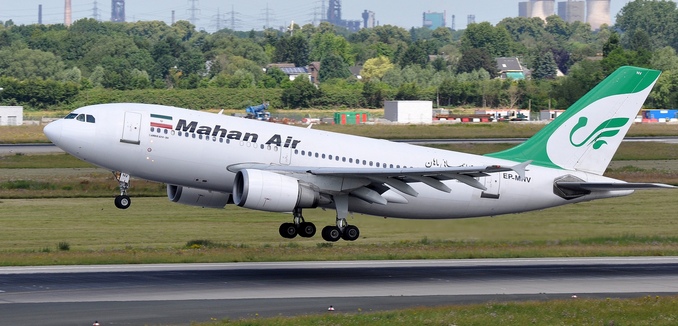A European plan to allow an Iranian airline sanctioned by the U.S. Treasury to fly commercial routes to European and Asian cities has drawn sharp objections from Washington, the Associated Press reported Wednesday.
European officials have pushed back against requests to join the U.S. in blocking Mahan Air’s financial network, a U.S. Treasury official told the AP. Mahan was sanctioned in 2011 for transporting “personnel, weapons and goods” on behalf of the Lebanese terrorist group Hezbollah and flying weapons and personnel from Iran’s Islamic Revolutionary Guard Corps (IRGC) to Bashar al-Assad’s regime in Syria.
“How many dead Syrians does it take for the Europeans to think there is a threat?” asked Rep. Brad Sherman (D-Calif.), who wants the European Union to designate the airline as a terrorist entity. “We’re not saying Mahan Air assists the IRGC – we’d say Mahan Air is the IRGC – and we have to give notice to our friends in Europe. … This idea that we can allow Mahan Air to do whatever it wants just because there are temporary restrictions on the nuclear deal – that wasn’t the deal.”
Sherman has forcefully opposed the loosening of restrictions on selling aircraft to Iranian commercial carriers, which have historically and demonstrably been used by the Iranian regime for illicit purposes. He wrote a letter to Secretary of State John Kerry, Treasury Secretary Jacob Lew, and Commerce Secretary Penny Pritzker this past June to express his concern about Boeing’s sale of aircraft to Iran Air, another airline that was designated by the Treasury in 2011 for transporting “potentially dangerous Islamic Revolutionary Guard Corps (IRGC)-related cargo” and “missile or rocket components” to Syria. Although there are indications that Iran Air is still ferrying arms and personnel to back Assad in Syria — in June, the airline flew known weapons resupply routes to Syria three times — sanctions against it were dropped as part of the nuclear deal.
“Iran Air’s aircraft will undoubtedly be used in the future to continue to funnel lethal assistance to Assad, to Hezbollah, and to other entities,” Sherman’s letter read. Speaking at a House Financial Services Committee hearing in July, the congressman added, “We’re being asked to transfer planes to a company, Iran Air, that has served as an air force for terrorism.”
Emanuele Ottolenghi, a senior fellow at the Foundation for Defense of Democracies who tracks the activities of Iranian airlines closely, told the AP that “by letting Mahan Air in, the Europeans are forgoing a critical pressure tool that they have in their arsenal.”
In May 2015, reports surfaced that Mahan Air was using a front corporation to illegally purchase planes from a European supplier, in violation of U.S. sanctions. It was later reported that U.S. authorities had received advanced warning of the purchases from Israel, but did not prevent them. When the Treasury Department suggested that it might attempt to enforce sanctions by having the planes seized in international airports, Iran threatened to take legal action.
“Mahan Air might as well rename itself IRGC Air” for the support it gives to the Iranian force, Ottolenghi wrote last November, predicting that failure to take actions against it would damage American credibility:
Mahan uses its commercial fleet to support Tehran’s regional proxy wars while easily buying planes from European suppliers and getting ground services at foreign destinations. Unless the Obama administration is ready to inflict heavy penalties on firms, especially in Europe, enabling Mahan to continue its operations with impunity, the credibility of current U.S. policy on Iran will be further eroded.
[Photo: ERIC SALARD / Flickr ]




